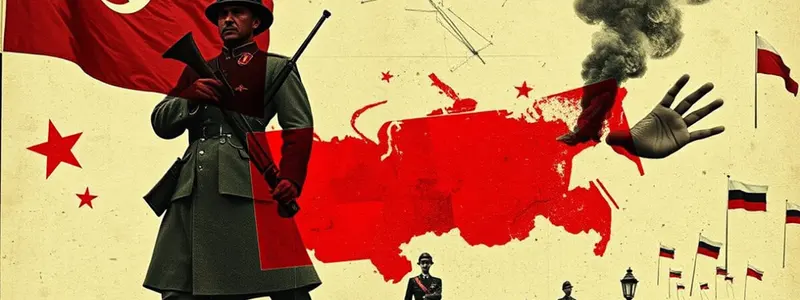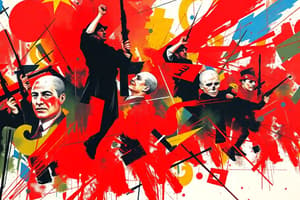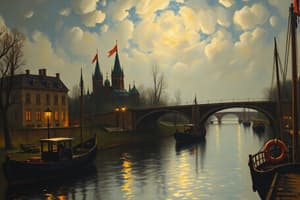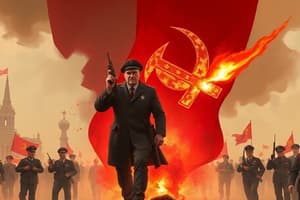Podcast
Questions and Answers
What is War Communism?
What is War Communism?
Also known as military Communism, was the economic and political system that existed in Soviet Russia during the Russian Civil War, from 1918 to 1921.
Who used War Communism and why?
Who used War Communism and why?
The Bolsheviks used War Communism to keep towns and the Red Army stocked with food and weapons due to the disruption caused by the ongoing war.
Who enforced War Communism?
Who enforced War Communism?
The Supreme Economic Council, known as the Vesenkha, enforced War Communism.
What were the policies of War Communism? (Select all that apply)
What were the policies of War Communism? (Select all that apply)
How did areas of Russia outside of Bolshevik control function during this time period?
How did areas of Russia outside of Bolshevik control function during this time period?
What could War Communism also represent?
What could War Communism also represent?
What was one goal of the Bolsheviks in implementing War Communism?
What was one goal of the Bolsheviks in implementing War Communism?
What did some Bolsheviks believe was the goal of War Communism?
What did some Bolsheviks believe was the goal of War Communism?
What do philosophers believe was the goal of War Communism?
What do philosophers believe was the goal of War Communism?
What was the result of War Communism in the military?
What was the result of War Communism in the military?
What was the result of War Communism in cities surrounding the countryside?
What was the result of War Communism in cities surrounding the countryside?
How did workers respond to War Communism?
How did workers respond to War Communism?
How was the government affected by War Communism?
How was the government affected by War Communism?
What emerged in Russia as a result of War Communism?
What emerged in Russia as a result of War Communism?
How was the economy affected by War Communism?
How was the economy affected by War Communism?
Flashcards are hidden until you start studying
Study Notes
War Communism Overview
- War Communism was the economic and political system in Soviet Russia from 1918 to 1921 during the Russian Civil War.
- Known as military Communism, it aimed to support the Red Army and urban areas amid the war's disruptions.
Implementation and Enforcement
- Bolsheviks adopted War Communism to maintain food and weapon supplies for towns and the Red Army.
- The Supreme Economic Council (Vesenkha) enforced this policy, which lasted until the New Economic Policy began in March 1921.
Policies Under War Communism
- All industries were nationalized, with strict central management imposed.
- State control over foreign trade was established.
- Worker discipline was rigid, prohibiting strikes; food and commodities were rationed and centrally distributed.
- Private enterprises were banned, and railways were subject to military-style control.
Outside Bolshevik Control
- Many regions remained outside Bolshevik control, leading to independent action due to poor communication.
- Local areas often functioned without coordination from the central government.
Interpretation of War Communism
- The term has sparked debate regarding whether it was a genuine economic policy or merely a temporary set of measures for civil war success.
- Some Bolsheviks viewed it as essential for winning the war, while others saw it as a step towards socialism.
Philosophical Perspectives
- Philosophers argue War Communism aimed to eliminate private property and market exchanges to establish communist economics, anticipating significant economic growth.
Military Outcomes
- War Communism successfully aided the Red Army in defeating the White Army and regaining territory.
Urban and Rural Impact
- Urban populations faced severe hardships, with peasants resisting food production.
- Many workers migrated to rural areas for better food security, worsening urban food shortages.
Worker Reactions
- Numerous strikes and peasant rebellions erupted, including significant events like the Tambov and Kronstadt rebellions.
- The Kronstadt rebellion particularly shocked Lenin, as the sailors were viewed as loyal supporters.
Government Crisis
- The government faced threats from the very classes it claimed to represent, as loyalty from villages, towns, and parts of the army diminished.
- The crisis paralleled that of the tsarist government's challenges in 1905 and February 1917.
Emergence of the Black Market
- A black market developed despite strict anti-profiteering laws; barter increasingly replaced the rouble as currency.
Economic Consequences
- Industrial output dropped to 20% of pre-war levels, with 90% of worker wages paid in goods.
- A large portion of locomotives required repairs, and the combined effects of war and drought severely affected food requisitioning and availability.
Studying That Suits You
Use AI to generate personalized quizzes and flashcards to suit your learning preferences.




